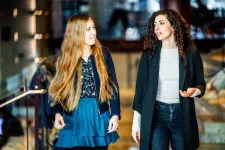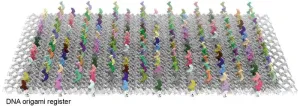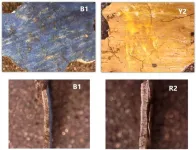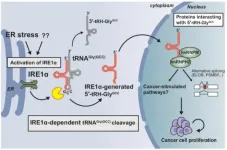(Press-News.org) Religious believers are no more generous than atheists – at least as long as they don’t know what the recipient believes in. Finding this out increases generosity significantly, mainly because people give more to those who share their religion. This is the conclusion of a study carried out at Linköping University, Sweden.
Nathalie Hallin is an atheist. Her colleague Hajdi Moche is a Christian. They both have a postdoc position at the Department of Behavioural Sciences and Learning at Linköping. Together they wanted to find out if a religious belief makes a person more generous, which research has so far disagreed on and they themselves have discussed a lot. To find the answer, together with their co-authors Gerhard Andersson and Daniel, they have carried out three studies: one in Sweden, one in the USA and a combined one in Egypt and Lebanon. The results are published in the journal Judgement and Decision Making.
The Swedish study included 398 people. These were given the task of distributing fictitious money between themselves and three hypothetical recipients over six rounds. They then answered questions about religious affiliation and political beliefs, but also about things such as favourite hobby, favourite film genre and the like.
In all rounds, participants were told something about the recipients, for example about hobbies, political conviction or which films they liked. In one of the rounds, information about religion was given. The researchers then examined how the participants’ generosity was affected by what they were told.
In most of the rounds, it turned out that religious and non-religious people gave away the same amount of money. But when they learned about the recipients’ religion, there was a clear difference. Religious believers became more generous than the non-religious participants. This was shown mainly by them giving more money to those of the same faith as themselves. But atheists also proved to favour their own group.
“I was actually surprised because the only thing that unites atheists is that you don’t believe in a god,” says Nathalie Hallin.
Follow-up studies with just over 700 people in the USA and about 600 in Egypt and Lebanon gave the same results: religion was the factor that had the greatest impact on generosity and the participants favoured the group that had the same faith as themselves.
In all three studies, Nathalie Hallin and Hajdi Moche also investigated whether generosity differed between different religions and outlooks on life. The participants were divided into three groups: Christians, Muslims and atheists.
The analysis showed that Muslims in the USA were more generous to their own kind than Christians and atheists were. There were also signs of this in Sweden, but the number of Muslims who participated was too low to say for sure. In Lebanon and Egypt, however, there was no difference in how much Christians and Muslims gave. Whether this is due to different cultural norms, the position of Muslims in American society or something else is uncertain. In Egypt and Lebanon there were too few atheists in the survey to make a comparison.
As researchers, Nathalie Hallin and Hajdi Moche find it interesting that the relationship to religion has such a strong impact on generosity and group feeling but are careful not to evaluate this. According to them, favouring one’s own can be considered unfair, but can, for example, be seen as better than not being generous at all.
“At the same time, you can be generous in different ways. You can be generous with time, with love or with care. So whether there is anything in religion that says you should be generous with money in particular is something to think about anyway,” says Hajdi Moche.
The study was funded by the Swedish Research Council and Linköping University.
END
Religious people are not more generous – with one exception
2024-12-11
ELSE PRESS RELEASES FROM THIS DATE:
PARP inhibition shows long-term survival benefits for patients with high-risk, BRCA-positive breast cancer in OlympiA trial
2024-12-11
SAN ANTONIO – Patients with high-risk, BRCA-positive breast cancer who received olaparib (Lynparza) after standard treatment continued to have better survival outcomes than those who received placebo after a median follow-up of 6.1 years, according to the latest results from the phase III OlympiA clinical trial presented at the San Antonio Breast Cancer Symposium (SABCS), held December 10-13, 2024.
“The OlympiA trial examines adding one year of the oral PARP inhibitor olaparib after completion of standard treatment ...
BRCA-mutation carriers with a history of early-onset breast cancer may benefit from risk-reducing surgery
2024-12-11
SAN ANTONIO – Patients with germline BRCA mutations who were diagnosed with breast cancer at or before age 40 and who underwent a bilateral risk-reducing mastectomy (RRM) and/or a risk-reducing salpingo-oophorectomy (RRSO) had lower rates of recurrence, secondary breast and/or ovarian malignancies, and death than those who did not undergo these surgeries, according to results presented at the San Antonio Breast Cancer Symposium (SABCS), held December 10-13, 2024.
“The benefits of RRM and RRSO have been shown for BRCA-mutation carriers without a prior history of cancer, but their impact for BRCA-mutation carriers with a history of early-onset breast cancer is less clear,” ...
Next-generation SERD protects against progression in some patients with advanced breast cancer resistant to standard hormone therapy
2024-12-11
SAN ANTONIO – Imlunestrant, an investigational next-generation selective estrogen receptor degrader (SERD), improved progression-free survival in patients with endocrine therapy-pretreated, ER-positive, HER2-negative advanced breast cancer—as monotherapy in patients with ESR1 mutations and as combination therapy with abemaciclib (Verzenio) in all patients, regardless of ESR1 mutation status—according to results from the phase III EMBER-3 clinical trial presented at the San Antonio ...
Carnegie Mellon University Africa and Challenger Center collaborate to deliver STEM programs
2024-12-11
Carnegie Mellon University Africa and Challenger Center Collaborate to Deliver STEM Programs
Partnership Will Promote STEM Education and Careers to Secondary School Students in Africa
Carnegie Mellon University Africa, CMU’s College of Engineering location in Kigali, Rwanda, and Challenger Center, will partner to deliver Challenger Center’s Virtual Missions to hundreds of secondary school students on the continent. This project will help grow the population of African students who are motivated to pursue higher education and careers in science, technology, engineering, and math (STEM) fields.
Challenger Center’s Virtual Missions are space-themed experiences for students ...
Top five rising star Texas researchers named in 2025 Edith and Peter O’Donnell Awards by TAMEST
2024-12-11
Identifying novel therapeutic strategies and making fundamental discoveries related to small cell lung cancer. Creating environmental and sustainable solutions for lithium-ion battery technology. Improving the safety and efficacy of gene editing and understanding the mechanisms of DNA repair to potentially cure diseases. Discovering the most distant and massive galaxies that have reshaped our understanding of early Universe star formation and supermassive black holes. Pioneering geochemical fingerprinting technology to optimize energy production processes.
These are the breakthroughs ...
Fast, rewritable computing with DNA origami registers
2024-12-11
DNA stores the instructions for life and, along with enzymes and other molecules, computes everything from hair color to risk of developing diseases. Harnessing that prowess and immense storage capacity could lead to DNA-based computers that are faster and smaller than today’s silicon-based versions. As a step toward that goal, researchers report in ACS Central Science a fast, sequential DNA computing method that is also rewritable — just like current computers.
“DNA computing as a liquid computing paradigm has unique application ...
Uncovering the pigments and techniques used to paint the Berlin Wall
2024-12-11
Street art takes many forms, and the vibrant murals on the Berlin Wall both before and after its fall are expressions of people’s opinions. But there was often secrecy around the processes for creating the paintings, which makes them hard to preserve. Now, researchers reporting in the Journal of the American Chemical Society have uncovered information about this historic site from paint chips by combining a handheld detector and artificial intelligence (AI) data analysis.
“The research highlights the powerful impact of the synergy between chemistry and deep learning in quantifying matter, exemplified in this case by pigments that make street ...
MD Anderson’s Lauren Averett Byers receives TAMEST O’Donnell Award for seminal contributions to lung cancer research
2024-12-11
HOUSTON ― Lauren Averett Byers, M.D., professor of Thoracic/Head & Neck Medical Oncology at The University of Texas MD Anderson Cancer Center, has received the
2025 Edith and Peter O’Donnell Award in Medicine from the Texas Academy of Medicine, Engineering, Science and Technology (TAMEST). The award recognizes her fundamental discoveries and contributions to identifying novel therapeutic strategies for small cell lung cancer (SCLC), which have paved the way for personalized treatments, even in the ...
Chung-Ang University researchers unveil the biogenesis and role of transfer RNA fragments in cancer progression
2024-12-11
To fill this knowledge gap, a group of researchers led by Professor Kangseok Lee, from the Department of Life Science, Chung-Ang University set out to explore the biogenesis and function of specific tRFs like tRHs. Their study published in Volume 15 of Nature Communications on 28 October 2024, opens exciting avenues for the future of cancer therapies and introduces potential biomarkers for improved clinical outcomes.
This study was inspired by a serendipitous discovery in 2010, when the researchers found high levels of small RNA fragments derived from specific tRNAs, rather than the anticipated ...
Secret of the female orgasm uncovered by psychologists
2024-12-11
The secret of the female orgasm may have been revealed by scientists in a pioneering study.
Researchers led by the University of Essex found that women climax more frequently if they have high levels of an inward-looking sense known as interoception.
Dr Megan Klabunde, from the Department of Psychology, discovered women who noticed and attend to internal bodily signals– like heartbeats, breathing, and sensual touch sensations - have more frequent orgasms.
Dr Klabunde says this is one of the first times healthy female orgasms have been studied and they are important for women’s well-being and boost relationship satisfaction.
Improving lives
It is hoped the ...







